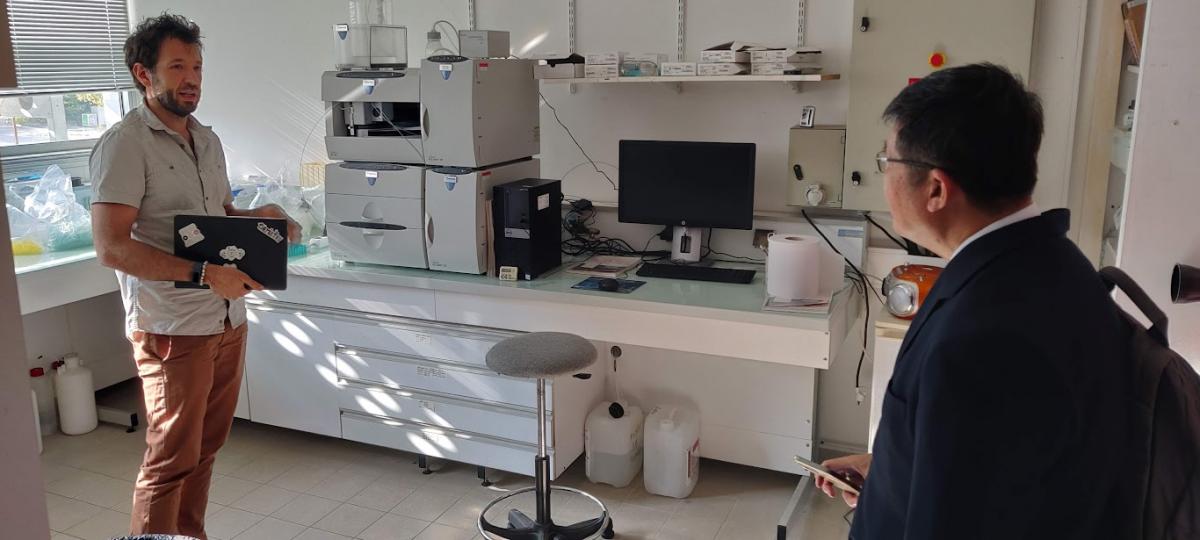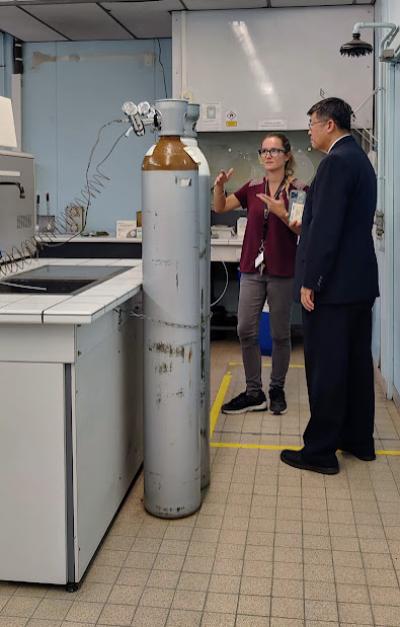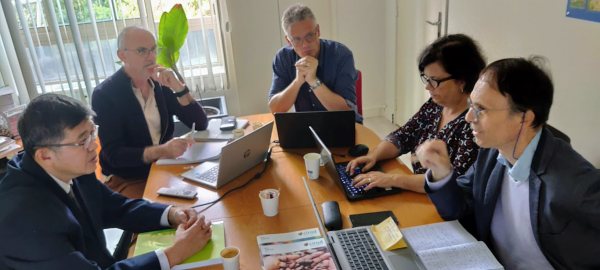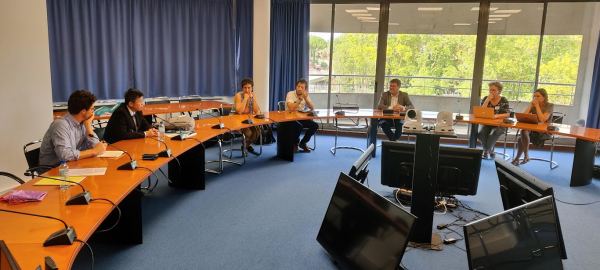- Home
- Worldwide
- Our regional offices
- Continental Southeast Asia
- News : Continental Southeast Asia
- Cambodia Agriculture Vision
Cambodia's Agricultural Vision: A Leap Towards International Markets

Dr. Saruth visits the CIRAD laboratories with Adrien Servent (UMR QUALISUD) © CIRAD, 2023
Construction of the National Agricultural Laboratory
One of the most pressing challenges for Cambodia's agricultural sector is product certification for export. While numerous institutions issue certificates, they frequently fall short of meeting the rigorous requirements of international buyers.
In response to this obstacle, MAFF has set a target to establish a National Agricultural Laboratory (NAL) to represent Cambodia and unify its quality certification process to gain international recognition. The NAL aims to set a national standard for quality and reliability, ensuring that Cambodian products meet the criteria for domestic and international markets.
From 2 to 5 October, to prepare for the implementation of this plan, CIRAD's regional office for Continental Southeast Asia funded the trip and, with its correspondent in Cambodia, Mr Florent Tivet, in coordination with CIRAD's regional office in Montpellier-Occitanie, organized a visit for Dr Saruth to Montpellier, France. During the visit, Dr. Saruth took references from both CIRAD’s research and service laboratories on the nature of the expertise that could be offered and their organizational modalities. CIRAD provides an example for how infrastructure like the NAL can serve multiple functions, both as a foundational infrastructure for institutions in agricultural science and as a service provider.
MAFF’S long-standing collaboration with CIRAD, extending over two decades, highlights CIRAD’s position as a reliable partner that can be a guarantor of public trust, as well as provide consultation and capacity-building support to the restructuring efforts. “The first role we see for CIRAD in this plan is for building trust and belief,” affirms Dr. Saruth, explaining his hope for CIRAD to achieve public confidence in the NAL, serving as a guarantor of quality and reliability, “that is the goal of my visit, to have more confidence.”
Streamlining research efforts for a unified direction in research activities
Research coordination is another critical aspect of Cambodia's agricultural transformation. Currently, various technical institutions conduct research independently without a unified direction. “So far we have no platform at the ministry level who facilitates and mainstreams the research activity on agriculture in an unified direction. Different technical institutions just apply and do research differently,” explains Dr. Saruth.
Building upon the model of CIRAD's other regional partners, MAFF's new mandate will seek to create an institution to represent and coordinate research activities in the Cambodian agricultural sector. This institution will craft a comprehensive master plan, monitor progress, and facilitate collaboration among research and educational institutions.
During the visit, Dr. Saruth also met with Mrs. Mélanie Broin and Patrick Caron from Agropolis International and with Ms. Elisabeth Claverie De Saint Martin, CIRAD’s CEO to discuss the MAFF’S plan. In addition to infrastructure development and research coordination, enhancing the technical capacity of staff is a crucial component of MAFF's priorities. “We believe that we can also send some of our technical staff to study short and long term [at CIRAD], and then when the equipment will be installed, they could come back and work there more effectively,” explains Dr. Saruth as an opportunity to send personnel to CIRAD's laboratories in Montpellier for technical capacity-building.
Cambodia's vision for its agricultural sector is one of collaboration, science, and progress. By establishing a National Agricultural Laboratory, improving research coordination, and maintaining a strong partnership with CIRAD, the country aims to overcome the entry barriers to the international markets. This collaborative approach signifies the MAFF’s commitment to ensuring the quality and safety of its agricultural products, boosting international trade, and advancing the nation's agricultural research capabilities.


























